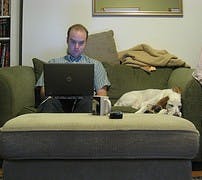So you want to work remotely, huh? Well, let me discuss a little bit about my experiences in making this transition; both the ups and the downs. As a bit of background, I was a full cycle recruiter for about two years before switching gears and providing Internet search as a consultant. In October 2007 I made the change, and I’ll be the first to admit that it’s not the easiest thing in the world — but quite possibly one of the most rewarding. The main challenge you’ll find is in the psychological aspect of adjustment from an office setting to a home setting.
The biggest problem in making the change that I came across is dealing with consistency. When you live and work in the same place, the difficulty becomes separating your working life from your daily life. If you sit down and think about all of those things that you’ve been meaning to do but just haven’t gotten to around the house… I think you’ll see where I’m going. Being able to define the line between work and pleasure is perhaps even more difficult at first, but one that must be done in order to survive. Coming from a 9-5 office job, the idea of working from home seemed too good to be true…
Waking up and not having to rush out the door…
Staying in your pajamas while you work…
Taking your time making breakfast…
All of these seem ever so inviting, but if you don’t keep an eye on the clock you’ll find yourself working later and later. This quickly became a problem that I ran into head on, still fight with, and had the hardest time adjusting to. With 24 hours in the day, it always seems like there is time enough to move your schedule around and get back to work a little later on. Maybe taking a nap, going out shopping, having a longer than usual lunch, or even just catching up on your Tivo. Eventually, I found myself spending more of my mornings and afternoons doing things like this, which pushed my work hours purely into the evenings. I won’t lie — it doesn’t have its advantages, however it also has its share of headaches, which I very quickly discovered.
At first things seemed to be a little too perfect. I often found myself trying to get the things done in the day that were usually a little more difficult to do during the evenings. Food shopping for one is much easier when you don’t have to stand in lines or fight for a shopping cart. Cleaning during daytime hours is also a lot easier because you actually have the energy to do it. At night the world is quiet so you aren’t getting text messages, instant messages, phone calls, emails, or any other form of communication from your friends who happen to be bored at work with nothing better to do than bother you. You also can’t do a lot of things during the evening that you could during the day, like retail shopping, major home improvements, or spending time with your friends because they’re already tired and ready for bed, so there is even less temptation.
It’s really a very peaceful and distraction-free world, which sounds ideal until you realize that you need to ask one of your colleagues a very important question — which could make or break the time you’re about to invest in a project.
After a few months of this it became obvious how important being awake and working during daylight hours actually was for me. Not being able to discuss your work with your co-workers is probably the most critical flaw, especially in the beginning because your communication becomes a game of tag with email. I also came to realize just how lonely it was during the evenings and began to really miss social interaction. I wound up adopting two cats to keep me company, but regardless of how much they looked like they were interested in the problems I was having when I couldn’t get in touch with any of my colleagues, they really had no idea what wass going on, and I didn’t think they’d really care anyway. Finding the balance here was a very big step for me, but I did eventually find a happy medium.
I found that splitting the day is the best alternative if you want to both enjoy the benefit of working from home and also maintain steady work habits. My decision was to begin splitting my days in half and giving myself a few hour window between shifts. Working from 11am until 5pm, I’m up and able to maintain contact with the rest of the world, then breaking until around 10pm and utilizing that peace and serenity to make sure all of my work is complete and accurate. In the end, it seemed to work out for the best and things have become much more stable in my life.
The overall thing to keep in mind is that if you take too much advantage of the opportunity that working remotely affords you, you’re destined to fail. You need to be able to keep yourself in check and make sure that work comes first. To this day I still have problems making the choice between work and play, and I know many of our peers also run into the same conflict. The luxury that is granted to you should be appreciated and enjoyed, but also kept under watchful eye at all times. There is no miracle solution to the problem other than being sure that you have the discipline to follow through and not miss a beat.
I certainly wish the best of luck to any of those who are also experiencing similar things or will be in the near future and I invite any advice that you might have for anyone looking into this type of a working situation!
image source: Plutor
